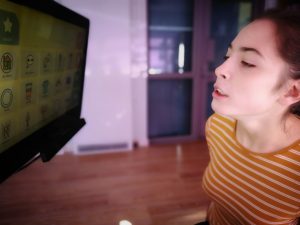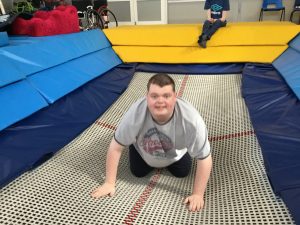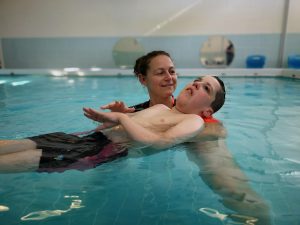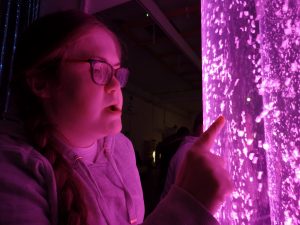Therapies at Chadsgrove Educational Trust Specialist College
Students at CET have access to a varied therapy programme that is personalised to meet their individual needs. Below are some of the therapies on offer as part of the curriculum.
Physiotherapy
Where appropriate students follow a personalised physiotherapy plan designed by our College Physiotherapist. We employ a private Physiotherapist to ensure students get continued input for their physiotherapy needs whilst in further education. Our College Physiotherapist works closely to train staff so that they can then support the physiotherapy plans throughout the week, embedding physiotherapy into each students everyday timetable. The Physiotherapist monitors progress and adapts plans when necessary, to ensure each student receives maximum benefit from their personal plan.
Speech and Language Therapy

Communication is an integral part of our Curriculum. We firmly believe that communication is pivotal in empowering students to play an active part in decision making and enabling them to become as independent as possible. Students have a baseline assessment with our Speech and Language Therapist. A Speech and Language Therapist is employed by the College to ensure maximum specialist support with the development of our students’ communication skills. They provide specialist training and advice to our staff so that students have access to low and high tech Augmentative and Alternative Communication (AAC) equipment, such as Communication in Print Symbols, Switches, Eye Gaze, objects of reference and Talk 4 Technology. Staff are trained Signalong Practitioners and use signing throughout the day to support communication with students.
Occupational Therapy
We employ a private Occupational Therapist. The aim of an Occupational Therapist is to help people improve their ability to function as independently as possible so that they can participate in whatever activities are meaningful and important to them. Occupational therapists do this mainly by identifying and eliminating environmental barriers to independence and participation in normal daily life.
Rebound Therapy

Rebound therapy offers students a movement programme that uses trampolines to enhance movement patterns, provide therapeutic positioning and exercise. Rebound therapy is a fun and interactive activity that enhances communication, self-confidence, co-ordination, balance, muscle tone, freedom of movement and relaxation. Rebound therapy offers additional health benefits such as stimulation of the digestive system, improved bowel function, internal organ massage, improved clearing of toxins from the body and respiratory benefits. Staff delivering rebound therapy sessions have completed a certified accredited training course and students work towards personal targets provided in close consultation with our Physiotherapist. For more information about Rebound Therapy and to see a full list of benefits visit www.reboundtherapy.org.
Hydrotherapy

Students that are identified by our Physiotherapist as high priority for benefitting from hydrotherapy sessions, have access to the hydrotherapy pool at Chadsgrove School. These students follow individualised hydrotherapy programmes provided by our Physiotherapist. The warm water in a hydrotherapy pool has many therapeutic benefits for our students such a relief of pain and muscle spasms, maintenance or increase in range of motion of the joints, improved circulation, strengthening of weak muscles and an increase in tolerance to exercise, maintenance and improvement of balance, coordination and posture, and independent standing in water to improve leg strength and mobility. Hydrotherapy has a positive effect on our students’ mental health and well-being. Students experience an increased level of independence and freedom of movement in the water, which is particularly beneficial for our wheelchair users.
Music Therapy
Music Therapist, Alison Douglas, works with identified students. Music therapy provides concrete, multi-sensory stimulation (auditory, visual and tactile), for students with special needs. Music therapy supports the development of skills such as release and exploration of emotions, non-verbal and verbal communication, listening, use of both gross and fine motor movements, active and improvised music making (using instruments and voice) and sequential memory and recall of information. During music therapy sessions, there are opportunities for individual self-expression through playing musical instruments, and for whole group participation.
Therapy Dog

A Therapy dog is a dog that is used to benefit people in a therapeutic way. We have visits from two therapy dogs and we incorporate a wide range of activities into individual students’ therapeutic programmes. Students can also learn about animal care and experience walking, grooming and feeding the dogs. Therapy dogs can have a positive effect on the students’ emotional well-being and physical independence. They enable students to develop a sense of responsibility and build self-esteem.
Sensology

The aim of ‘Sensology’ is to ‘wake up’ the five senses (sight, hearing, touch, smell and taste). It also involves movement related to the sensory systems: the vestibular (balance, head movements and gravity) and the proprioceptive (body positions, body mapping and planning movements). Each session begins with music then each of the senses are stimulated and introduced individually. ‘Sensology’ sessions provide opportunities for students to begin to show awareness, engagement and enable them to show preferences.
Story Massage
Story massage is a programme that offers a fun and interactive way of combining the creativity of story with the benefits of positive touch. During story massage, students experience relaxation of the body and mind. It improves alertness and concentration and encourages students to work together. Students may wish to observe and not participate in story massage and instead listen to the words of the story. Alternatively, they may wish to do the massage strokes in the air or experience the strokes by doing them on themselves.